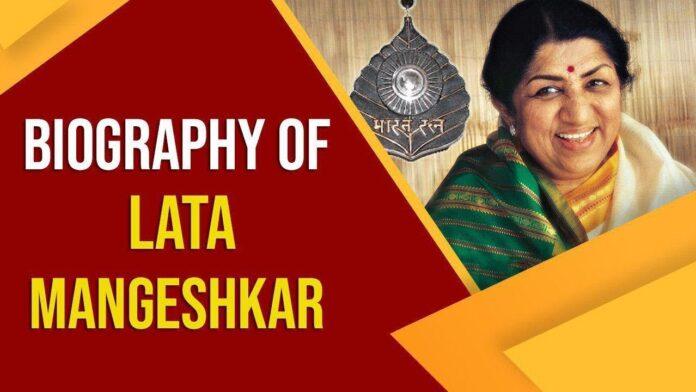The magical voice of Lata is loved by the Indian subcontinent as well as all over the world. Time magazine has acknowledged her as the indispensable and quintessential empress of Indian playback singing. The Govt. of India honored her with ‘Bharat Ratna’.
He died due to complications related to Kovid on 6 February 2022, Sunday Magh Shukla Paksha Panchami Tithi Vs 2078 (Panchak) at Breach Candy Hospital, Mumbai. She was ill for some time. Her great singing and melodious voice are crazy all over the world. [3] Everyone affectionately calls her ‘Lata Didi’.
Childhood
Lata was born into a middle-class family of Pandit Deenanath Mangeshkar as the eldest daughter in the city of Indore, Madhya Pradesh, to a Karhada Brahmin grandfather and Gomantak Maratha grandmother. His father was an artist and singer of Theater LG. From his family, brother Hridaynath Mangeshkar and sisters Usha Mangeshkar, Meena Mangeshkar and Asha Bhosle all chose music for their livelihood.
Although Lata was born in Indore, she was brought up in Maharashtra. She wanted to become a singer since childhood. Seeing Chandidas, a film by Kundan Lal Sehgal in her childhood, she had said that she would grow up to marry Sehgal. For the first time, Lata sang for Keerti Haasal, a film directed by Vasant Joglekar. Her father did not want Lata to sing for films, so the song was dropped from the film. But Vasant Joglekar was very much impressed by his talent.
After the death of her father (when Lata was only thirteen years old), Lata faced severe shortage of money and struggled a lot. He did not like acting very much but due to the untimely death of his father, he had to work in some Hindi and Marathi films for money. Her first film as an actress was Pahili Mangalagore (1942), in which she played the role of Snehaprabha Pradhan’s younger sister. He later acted in several films, including Majhe Bal, Chimukala Sansar (1943), Gajbhau (1944), Badi Maa (1945), Jeevan Yatra (1946), Maand (1948), Chhatrapati Shivaji (1952). Lata starred opposite Noor Jahan in Badi Maa and Asha Bhosle played the role of her younger sister. He also sang songs for herself and did playback for Asha. In 1947, Vasant Joglekar gave Lata a chance to sing in his film Aapki Seva Mein. Lata was discussed a lot with the songs of this film. After this, Lata cemented her position with songs like “Angrezi Chhora Chala Gaya” and “Dil Mera Toda Hi Mujhe Kahin Ka Na Chhod Tere Pyaar Ne” from the film Majboor. However, despite this, Lata was still looking for that special hit.
In 1949, Lata got such an opportunity with the song “Aayega Aanewala” from the film “Mahal”. The song was picturized on Madhubala, the most beautiful and popular actress of that time. The film was a huge success and proved to be very auspicious for both Lata and Madhubala. After this, Lata never looked back.
Diverse
- Father Dinanath Mangeshkar was a classical singer.
- She sang her first song in the Marathi film ‘Kirti Hasal’ (Kitna Hasoge?) (1942).
- Lata Mangeshkar got her biggest break from the film Mahal. His sung “Aayega Aane Wala” was a super duper hit.
- Lata Mangeshkar has sung more than 30000 songs in more than 20 languages till now.
- Lata Mangeshkar reduced singing in films from 1980 onwards and focused more on stage shows.
- Lata was the only survivor in whose name awards are given.
- Lata Mangeshkar has also produced and composed the films under the banner of Anand Ghan.
- She always used to take her slippers off her feet while recording or singing songs at her (barefoot) studio, stage etc.
Award
- Filmfare Awards (1958, 1962, 1965, 1969, 1993 and 1994)
- National Awards (1972, 1975 and 1990)
- Maharashtra Government Award (1966 and 1967)
- 1969 – Padma Bhushan
- 1974 – Guinness Book Record for most songs in the world
- 1989 – Dadasaheb Phalke Award
- 1993 – Life Time Achievement Award at Filmfare
- 1996 – Screen Lifetime Achievement Award
- 1997 – Rajiv Gandhi Award
- 1999 – NTR Award
- 1999 – Padma Vibhushan
- 1999 – Lifetime Achievement Award by Zee Cine
- 2000 – I.I.A. F. Lifetime Achievement Award of
- 2001 – Stardust’s Lifetime Achievement Award
- 2001 – India’s highest civilian award “Bharat Ratna”
- 2001 – Noor Jahan Award
- 2001 – Maharashtra Bhushan




